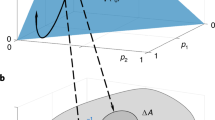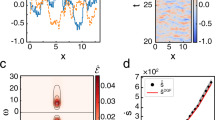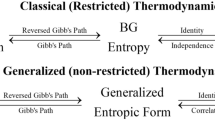Abstract
THE isokinetic relationship or, more generally, the compensation law, a linear relation between enthalpy and entropy, has been debated for many years. Evidence for it occurs in phenomena such as chemical reactions, solubility, evaporation of metals, catalytic processes, thermal denaturation of macromolecules, thermal killing of unicellular organisms, and semiconduction processes. Such a widespread occurrence advises avoidance of ad hoc explanations, and suggests a common denominator on a thermodynamic or statistical mechanical basis.
This is a preview of subscription content, access via your institution
Access options
Subscribe to this journal
Receive 51 print issues and online access
$199.00 per year
only $3.90 per issue
Buy this article
- Purchase on Springer Link
- Instant access to full article PDF
Prices may be subject to local taxes which are calculated during checkout
Similar content being viewed by others
References
Banks, B. E. C., Damjanovic, V., and Vernon, C. A., Nature, 240, 147 (1972).
Exner, O., Coll. Czech. Chem. Comm., 37, 1425 (1972).
Rosenberg, B., Kemeny, G., Switzer, R. C., and Hamilton, T. C., Nature, 232, 411 (1971).
Author information
Authors and Affiliations
Rights and permissions
About this article
Cite this article
KEMENY, G., ROSENBERG, B. Compensation Law in Thermodynamics and Thermal Death. Nature 243, 400–401 (1973). https://doi.org/10.1038/243400a0
Received:
Revised:
Issue Date:
DOI: https://doi.org/10.1038/243400a0
This article is cited by
-
Surface single-molecule dynamics controlled by entropy at low temperatures
Nature Communications (2017)
Comments
By submitting a comment you agree to abide by our Terms and Community Guidelines. If you find something abusive or that does not comply with our terms or guidelines please flag it as inappropriate.



